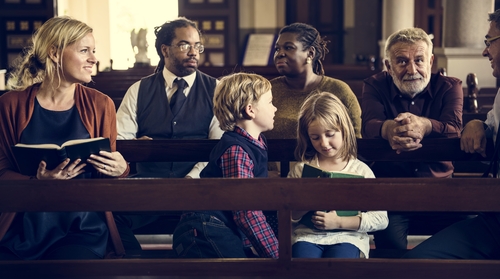The Liturgy of the Word at Mass requires not only skilled lectors proclaiming, but also active and attentive listeners participating. These two elements bring the church community together into a silent dialogue with God and with one another.
We all know what it feels like when we are speaking and someone hears us but isn’t really listening. We also know what it feels like when we ourselves are only half-listening to someone else. There are different degrees of listening, which result in varying levels of information and knowledge received. We might refer to this half-listening as cursory listening, and agree that it does not result in good communication.
It is safe to assume that any good relationships are built on full-bodied listening on the part of all who are involved. In families, offices, schools, churches, and in any relationship, listening is the most important communication skill we can learn, and like all skills acquired in life, listening takes on-going practice.
Too often, at Mass, we ordinary pew-dwellers are not attentive listeners. We choose to use the ordered atmosphere of our ritual prayer to spend time in our own private thoughts with God, rather than as the active and attentive listeners required of our role as members of the assembly.
Good liturgy does not happen with only active speakers. We have the opportunity every week at Mass to practice our listening skills. We can choose to listen in a cursory fashion, or we can choose to practice active listening.
Good listening stimulates better speaking. In other words, if we know for certain that others are listening attentively to what we have to say, we will invest more of our own skill in whatever speaking we are doing. This applies to lector ministry. Lectors do not just offer a public reading of the Word of God. They need to invest their own skill in communicating, not just the content of the Word, but the message of the Word. This requires reflective and effective preparation and practice.
Every member of the assembly, though, also has a role to play in this communication of God’s Word. We are responsible to prepare ourselves effectively and to listen attentively and actively, without getting distracted by other thoughts and activities.
The Constitution on the Sacred Liturgy, 1963 (Vatican II) called every member of the assembly to full, conscious, and active participation. We often don’t realize that listening must be full, conscious, and active — but these are, in fact, the qualities of active listening. Attentive listening also requires our silence, silence of mind as well as voice.
In the musical “Hamilton,” Aaron Burr recommends to Hamilton: “Talk less, smile more.” This is wonderful advice for all of us. It is another way of saying “talk less, listen more,” be attentive to whoever is speaking, not just absorbed in your own thoughts. If we are smiling at Mass, whoever is speaking in that given moment will be motivated by our smiles and attentiveness, and will respond with more acuteness and energy. That smile is an outward expression of the inner silent dialogue that God’s Word calls forth from within us.
God does not speak with a physical voice, so we often listen to God in a way that is absent of sound. As St. Benedict said, we listen with the ear of our heart. This is quite a different form of listening, and it is definitely a skill that requires practice. If we regularly practice silent listening at home, then when we participate in Mass we are more readily able to hear God in the Word proclaimed, and to connect with that inner silent dialogue that unites us, and that burns within us.
“God’s Word, God’s personal self-disclosure, comes to us in history in the form of an address. It is the lector’s proclamation of Scripture that allows the assembly to receive this divine address. … God’s Word demands a dialogue between God and humankind, and the ministry of the lector initiates that dialogue. Silent dialogue between the proclaimer of the Word and the listening assembly that ought to happen every Sunday, in every community. In the silence of people’s hearts, they ought to be responding to what they have heard, hurling their own questions and reactions back to the ambo.”
And in the end, “we will go forth from the liturgy, like the disciples who were schooled by Christ on the road to Emmaus, remarking to one another, ‘Were not our hearts burning within us?’ ” (Richard Gaillardetz, “Becoming Word for One Another: A Spirituality for Lectors”)
Start your day with Always Forward, our award-winning e-newsletter. Get this smart, handpicked selection of the day’s top news, analysis, and opinion, delivered to your inbox. Sign up absolutely free today!

